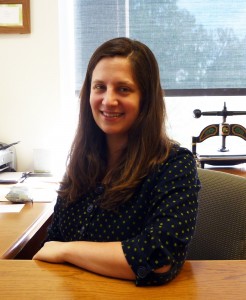
Have you ever wanted to know more about the people that help make the Oviatt Library such a great place to be? Starting this Spring semester you can meet some of these great librarians through interviews we will be posting here on the blog. These interviews allow you the chance to learn more about what we librarians do here at the Oviatt, what some of our personal interests are and maybe even learn something new and fun about the Library.
Let me introduce you to Ellen Jarosz, she’s the Special Collections and Archives Librarian. She’s been at the Oviatt since November 2011 and she originally hails from America’s Dairyland and home of the Packers, aka Wisconsin. We sat down together and here’s what she had to tell us about herself.
What do you like most about working with CSUN students?
I like how varied student backgrounds are across campus. The diverse perspectives, knowledge, and experiences really contribute to classroom dynamics.
What’s your favorite book?
My favorite book is The Bridge of San Luis Rey by Thornton Wilder. The prose is beautiful, the characters and setting are wonderfully real, the themes are complex yet straightforward, and it’s short enough that I can start and finish it in a couple of hours on a Sunday afternoon. It’s also one of the few books I first encountered as assigned reading, but liked enough to read again on my own. I’ve read it too many times to count, and I never get tired of it!
What is the one thing you wish every student knew about Special Collections and Archives?
We have a lot of very cool stuff in Special Collections and Archives that anyone can come in to use. The oldest item we hold is a Sumerian calendar inscribed on a clay cone in cuneiform that dates from approximately 2350 B.C. (and yes, you can come in to see it anytime we’re open!) We’ve recently started a new blog, called Peek in the Stacks, where you can read about and see images of collection materials we think are interesting, notable, or fun. You’re also welcome to search for materials in Special Collections via the Finding Aid Database or Library Catalog.
Why did you become a librarian?
I came to librarianship by way of archives. I worked as a research assistant for a history professor at the University of Wisconsin as an undergraduate, and he sent me to the National Archives and Records Administration research facility in College Park, MD. One of the reference archivists there took me into the (normally closed) stacks. While following him through the aisles of boxes and bound volumes, I was struck by the fact that I was surrounded by the documentary record of our nation.
That brief tour and the days I spent going through correspondence, memoranda, drafts of congressional reports with notes about which sections should be classified or redacted from public copies, and other materials, made for a very inspiring experience. When I got back to Madison I asked one of the reference librarians at the Wisconsin Historical Society Library what I had to do to have a job like that one. He talked to me about different educational options, but encouraged me to enter a graduate program in library science that included an Archives and Records concentration or track.
What is your favorite quote?
And suppose that you lived in that forest in France,
where the average young person just hasn’t a chance
to escape from the perilous pants-eating-plants!
But your pants are safe! You’re a fortunate guy.
And you ought to be shouting, “How lucky am I!”
–Dr. Seuss, Did I Ever Tell You How Lucky You Are?
If you could meet anyone living or dead who would it be?
George Sand. Any woman in 19th century France (but especially a baroness) who leaves her husband, carries on a 10-year affair with Frédéric Chopin, writes numerous works of fiction (novels, plays), non-fiction (literary criticism, political essays), AND publishes a socialist newspaper out of a worker’s cooperative in the middle of a revolution, all while going about in public wearing men’s clothing and smoking tobacco, is a woman I’d love to chat with over a cup of coffee.
If you could learn any skill what would it be?
I’ve only had the opportunity and time to study a few languages, but wish I could learn more.
If you could witness any event in history, what would it be?
The Yalta Conference in 1945. Aside from the obvious (that decisions made there had significant and long-ranging consequences in terms of international relations and geopolitics), it would be fascinating to be a fly on the wall in a room with Winston Churchill, Franklin Roosevelt, and Joseph Stalin, regardless of the topic of conversation.
– Laurie Borchard
Digital Learning Initiatives Librarian


